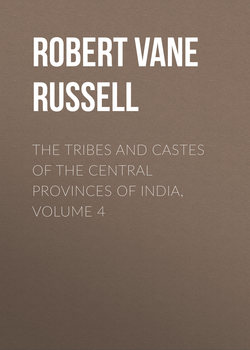Читать книгу The Tribes and Castes of the Central Provinces of India, Volume 4 - Robert Vane Russell - Страница 80
Part II
Articles on Castes and Tribes
Kumhār—Yemkala
Vol. IV
Kurmi
41. Caste-feasts
ОглавлениеAt the commencement of a marriage or other ceremonial feast the host must wash the feet of all the guests himself. If he does not do this they will be dissatisfied, and, though they will eat at his house, will consider they have not been properly welcomed. He takes a large brass plate and placing the feet of his guest on it, pours water over them and then rubs and dries them; the water is thrown away and fresh water poured out for the next guest unless they should be brothers. Little flat stools about three inches high are provided for the guests, and if there are not enough of them a carpet is spread; or baithkis or sitting-mats plaited from five or six large leaves are set out. These serve as a mark of attention, as it would be discourteous to make a man sit on the ground, and they also prevent the body-cloth from getting wet. The guests sit in the chauk or yard of the house inside, or in the angan or outside yard, either in lines or in a circle; members of the same caste sit with their crossed knees actually touching those of the man on either side of them to emphasise their brotherhood; if a man sat even a few inches apart from his fellows people would say he was out of caste—and this is how a man who is put out of caste actually does sit. Before each guest may be set two plates of leaves and eight donas or leaf-cups. On the plates are heaped rice, cakes of wheat fried in butter, and of husked urad pulse cooked with tilli or sesamum oil, and the pulse of gram and lentils. In the cups will be sugar, ghī, dahi or curded milk, various vegetables, pumpkins, and besin or ground gram cooked with buttermilk. All the male members of the host’s family serve the food and they take it round, heaping and pouring it into each man’s plates or cups until he says enough; and they continue to give further helpings as required. All the food is served at once in the different plates and cups, but owing to the number of guests a considerable time elapses before all are fully served, and the dinner lasts about two hours. The guests eat all the different dishes together with their fingers, taking a little of each according to their fancy. Each man has his lota or vessel of water by him and drinks as he eats. When the meal is finished large brass plates are brought in, one being given to about ten guests, and they wash their hands over these, pouring water on them from their vessels. A fresh carpet is then spread in the yard and the guests sit on it, and betel-leaf and tobacco are distributed. The huqqa is passed round, and chilams and chongis (clay pipe-bowls and leaf-pipes) are provided for those who want them. The women do not appear at the feast but stay inside, sitting in the angan or inner court, which is behind the purda.
